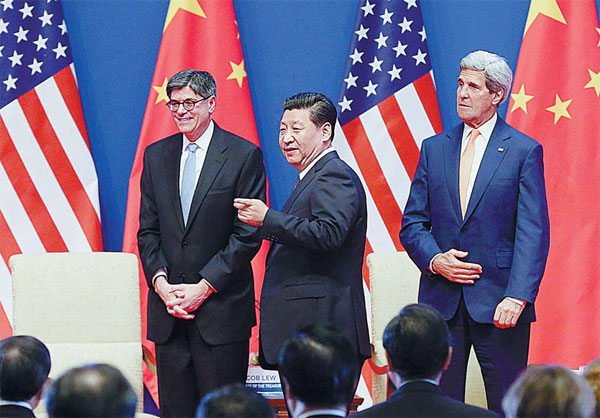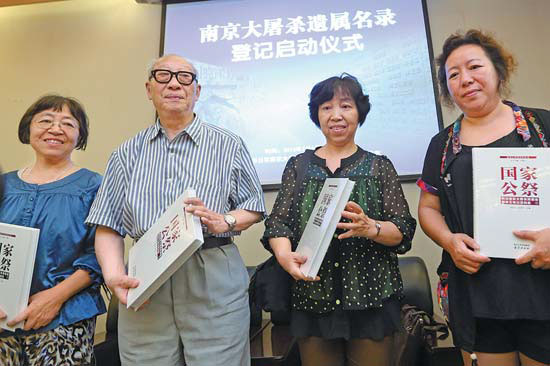What's news

| President Xi Jinping welcomes US Secretary of State John Kerry (right) and Treasury Secretary Jacob Lew at the opening ceremony of the China-US Strategic and Economic Dialogue in Beijing on July 9. Xu Jingxing / China Daily |
China, US vow to keep ties on track
Beginning a new round of high-level talks, Beijing and Washington vowed on July 9 they would not allow areas of disagreement to overshadow their relationship, which is critical to global prosperity.
Both countries expressed confidence that careful management of any differences would prevent escalating tension and that healthy competition, not confrontation, was the way forward. Observers said the dialogue would serve as a "disinfectant" to help cleanse wounds inflicted in a series of disputes.
"A China-US confrontation, for the two countries and the world, would definitely be a disaster," President Xi Jinping said at the opening ceremony of the sixth round of the Strategic and Economic Dialogue at the Diaoyutai State Guesthouse.
"The vast Pacific Ocean has ample space to accommodate our two great nations," Xi said.
US Treasury Secretary Jacob Lew has said he will press China to further appreciate its currency, open its financial services sector and speed up economic reforms in this round of talks.
US key to global recovery, minister says
A global economic recovery rests mainly on the United States' shoulders, Finance Minister Lou Jiwei said on July 9.
"A global recovery requires joint efforts from many countries, but the key lies with the US," Lou told reporters on the first day of the annual China-US Strategic and Economic Dialogue in Beijing. "China is experiencing a transition from a high-growth model to a medium-high-growth model. We are now focusing more on the 'new norm' of structural reform.
"So the scenario is unlikely to recur in which China contribute to half of the world's growth in the aftermath of the 2008 financial crisis."
The Chinese government has repeatedly said it would not roll out an intensive stimulus program after the nation's gross domestic product growth in the first quarter dipped to 7.4 percent, an 18-month low. It is the first time a top Chinese official has explicitly said that the global economy should not count on China for it to recover.
Massacre memorial website launched
China has launched a national memorial website to honor the victims of the Nanjing Massacre.
Zhu Chengshan, curator of the Memorial Hall of the Victims in the Nanjing Massacre by Japanese Invaders, said the website - www.cngongji.cn - will provide a place for Internet users to commemorate the victims, and to express their wishes for peace.
"The site contains opinions of celebrities and experts on the Nanjing Massacre," Zhu said. "Historical materials and news reports about the massacre can also be found."
Visitors can honor victims through online functions that allow users to virtually light candles, present flowers and plant trees.
The memorial website is currently provided in Chinese, Japanese and English, and French, German, Korean and Russian versions are expected to be added by early December.
Cities shortlisted for Winter Olympics bid
Beijing and co-host city Zhangjiakou in Hebei province have made it onto a shortlist of three candidate venues to host the 2022 Winter Olympics.
Oslo in Norway and Almaty in Kazakhstan are the other cities under consideration, the executive board of International Olympic Committee announced.
Yang Shu'an, vice-chairman of the Chinese bidding committee, said: "We are going to accelerate the grassroots promotion of winter sports and the improvement of urban infrastructure and public services, as well as air quality, by preparing for the games."
Yang also stressed the importance of preparing a frugal and sustainable bid, which could be achieved by using venues built for the 2008 Beijing Olympics and existing skiing facilities in the Chongli county of Zhangjiakou, about 200 kilometers northwest of the capital.
Only two new venues will be built: an indoor stadium with a 400-meter track for distance speed skating and a resort for alpine skiing in Yanqing county's Xiaohaituo Mountain area. An intercity high-speed railway is also planned to connect Beijing and Zhangjiakou, which will reduce travel time to about 40 minutes.
However, critics said the Chinese bid's lack of a winter sports tradition, compared to Oslo and Almaty, might count against it.
'Time is ripe' for BRICS development bank
The five major emerging economies - Brazil, Russia, India, China and South Africa - have reached a broad consensus on the creation of a jointly funded $50 billion development bank, which could finance future infrastructure ventures in their own and other developing countries.
The five BRICS nations are expected to sign a treaty to launch the bank officially when they meet at a summit in the northern Brazilian city of Fortaleza on July 15.
Chinese Vice Foreign Minister Li Baodong said that the "time is ripe" to announce the establishment of the bank, and that "all parties are in consensus".
He added: "Of course, there are a few differences and viewpoints on technical issues, but our goal is to establish the BRICS bank as soon as possible."
Govt will boost input for healthcare, Li says
To provide better healthcare services, the Chinese government will increase its input and encourage social capital to enter the industry, Premier Li Keqiang said on July 8.
These moves would help to minimize patients' out-of-pocket expenses, effectively prevent and cure diseases, and create more quality healthcare resources, Li said.
The biggest change in China's industrial restructuring is to develop its service industry, and the healthcare sector could take the leading role to benefit all citizens and boost growth, he said.
Li made the remarks during a meeting with Jim Yong Kim, president of the World Bank, and Margaret Chan, director-general of the World Health Organization.
It is a "creative step" for China, the World Bank and the WHO to jointly push forward China's healthcare reforms, the premier said.
Kim told Li he was on a "rare joint visit" to China with Chan because they "admire so much what you have done in the first phase of healthcare reform".
|
Yu Changxiang (second from left), a Nanjing Massacre survivor, and his family members receive books titled Guo Jia Gong Ji (National Public Memorial) as mementos at a ceremony to mark survivors' registration at the memorial in Nanjing on July 6. Yang Bo / China News Service |
(China Daily European Weekly 07/11/2014 page2)
Today's Top News
- New engine powers cargo drone expansion
- China to boost intl cooperation on green tech
- Factory activity sees marginal improvement in November
- Venezuela slams US' 'colonial threat' on its airspace
- Xi: Strengthen cyberspace governance framework
- Takaichi must stop rubbing salt in wounds, retract Taiwan remarks
































